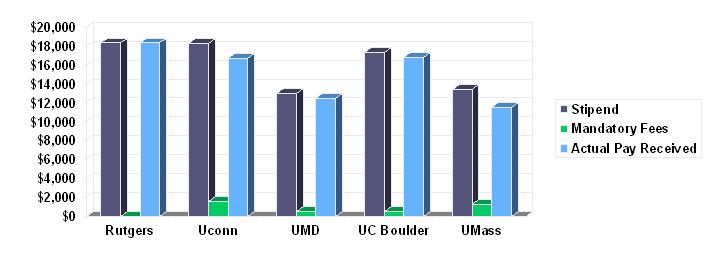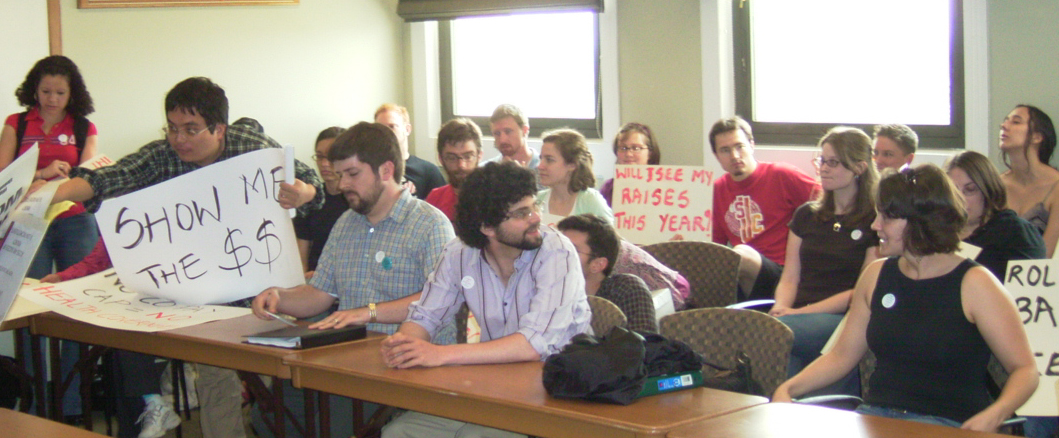May 24, 2007
Open Letter to Faculty, Please Support Graduate Students at UMass
Dear Faculty Members:
As you may know, the University and the Graduate Employee Organization (GEO)/UAW Local 2322 are currently in contract negotiations for a seventh agreement. We’ve been bargaining for 5 months, and have reached very little agreement with the administration. We would like to take an opportunity to open a dialogue with you and to share our thoughts on why these negotiations have been unproductive thus far.
Like any union, GEO surveyed its members prior to bargaining, and we based our proposals on the collective desires of our members to improve their working conditions and, we believe, at the same time improve the university as a whole. Our members overwhelming said they supported several things: rolling back mandatory fees which have increased more than 126% since 2001; getting cost of living raises; increasing job security, and improving structures that support a diverse student body, such as childcare support and diversity funding. Though the administration will claim that we have made an inordinate number of proposals, we can assure you that we are ready to reduce that number significantly to the core issues described above in the event that the administration begins to bargain in good faith and with full authority to discuss all issues, including financials.
So that you can get a sense of the objectives and thought behind our core proposals, we’ve provided a bit of information below:
Cost of living increases and rolling back fees:
Unfortunately, the standing of UMass graduate employees has significantly withered in relation to grad employees at our peer institutions. When you look at what’s left in graduate employees’ pockets after they subtract mandatory fees from their stipends, UMass falls dead last among its peers, and we think this means fewer grads will chose UMass. Why come here when they can receive a more compelling offer just down the road at UConn (where the average compensation package is $5000 greater than at UMass) or Rutgers, where graduate student fees were eliminated in the most recent grad employee union contract?

Our wage and fee proposals are intended to begin to address this disparity (although if UMass accepted our current proposal today, we would still be behind our peers). The combination of the two is meant to address the fact that every time our wages go up, they are almost entirely subsumed by the cost of rising fees.
We believe that we all have a stake in reducing mandatory fees—undergraduates, graduate students, and faculty. We have made the same proposal as MSP with regard to the curriculum fee because we see how this fee cripples departments, particularly when it comes to procuring grants for research. Were we to eliminate this fee charged per graduate employee to employing departments, we could hire 425 new graduate researchers or 95 new faculty, significantly increasing the capacity for cutting-edge research at UMass. We would all benefit from this.
Job Security
We know that you may have some reservations about our proposals in this area, and for this reason, we welcome your feedback. All we know is that many graduate employees feel an ever-present insecurity around their employment, and this isn’t conducive to learning, teaching or conducting research. We’ve made a few proposals in this area. The first is that we’d like more clarity in the language governing appointment/reappointment; however, we want to assure you that our proposal in no way infringes on your authority as management to make hiring decisions.
We’ve proposed that appointment/ reappointment policies either include option #1) standardized criteria for each position (TA, TO, RA) which address what qualifications are prioritized for funding for each position: e.g., how important is previous teaching experience vs. research experience, how is departmental progress weighted, and other criteria, such as how work performance in the department is evaluated with regard to future employment or option #2) that when graduate employees aren’t hired for a position they apply for, they be provided with a rationale for the decision. Let’s flesh these out: In the case of option #1, we aren’t interested in any way in dictating your positions on these questions, but believe it is reasonable that you take a position on these criteria, and be transparent about it. For instance, it would be fine to say that a) you prioritize funding 1st years, b) you prioritize funding those later in their program, or c) you prioritize 1st years in some cases and more advanced students in others, etc. This is not taking away your managements’ rights—this is asking you to make your management prerogatives clear to those trying to get hired, which we believe will reduce the kind of acrimony that develops when people feel they’re being left in the dark
Alternatively, we’ve proposed some minor reporting to the candidate about why they weren’t hired. This would only help potential graduate employees become better candidates in the future. In the end, we feel that if the administration can’t agree to a clear announcement of criteria within departments or programs before decisions are made, nor to a reporting after the fact, that the result is a lack of transparency unbefitting of a public institution.
In addition, we’ve proposed that all graduate employees who receive guarantees of employment receive at least 380 hours of employment in an academic year. The figure of 380 hours per academic year (i.e. 10 hours/week/semester) comes from the minimum earned dollar limit ($6688/academic year) set by the graduate school to be eligible for the tuition waivers and health benefits. 380 hours of employment at the minimum GEO stipend is $6935. Under our proposal, these 380 hours could come from one position, or from any combination of positions. Though it does not provide a graduate student a living wage, the minimum employment level we propose ensures that all graduate employees will receive benefits such as tuition waivers and health fees. While we’ve tried to acknowledge the constraints faced by departments in providing full employment, we also know that underemployment is one of the main reasons for which graduate students leave before completing their programs. The constant financial insecurity affects the academic progress of our members, as evidenced by the 46% dropout rate among UMass-Amherst graduate students. We believe that ensuring that, at the least, all graduate employees receive tuition waivers, fee waivers, and health benefits, can make a real difference in the ability of graduate employees to complete their programs.
In the current system departments pay a small health chargeback of $2.50/hour for each graduate employee. However, if a given graduate employee doesn’t meet the minimum total earning requirement, he or she does not receive health benefits, despite the fact that the department is paying into the benefit pool on his or her behalf. By ensuring that all graduate employees reach a minimum level of employment, we can also ensure that departments are not wasting their scarce resources by paying towards a benefit that their employees will not receive. A department, for example, that pays someone for eight hours of work per week at the campus minimum is paying $380/semester in health fee chargebacks, but the employee in question does not receive health benefits. Were that department to increase the employees hours to 10/week, the department would pay a total of $95 in additional health fee chargebacks, and the employee in question would receive a health fee waiver worth up to $2,200. We’re wasting scarce resources by failing to ensure these minimum levels of employment.
Our message with this proposal is simple—if you want to bring a graduate employee here, and ask them to commit to the university by moving hundreds or thousands of miles from their home, make a commitment to them of a minimum level of funding. We think it will: improve the retention of grads in your programs and help them focus on the core issues at hand of learning, teaching and research. If you can help us find the way to this goal through another course, we are willing to work with you.
Childcare:
Our proposal includes increasing the amount the university contributes to vouchers for low income students and asks the university to commit to maintaining an adequate and safe childcare center on campus. The administration has soundly rejected this proposal. We know that greater numbers of graduate students and faculty are coming to the university each year with young families—despite this reality, the university childcare center has long waiting lists, is housed in “temporary†buildings whose life expectancy is about to expire, and has mold problems. In addition, the voucher fund, which is provided for use mainly at off-campus sites when the center here is full, isless than half of what is needed to support graduate families on campus.
Diversity Funding:
Our contract provides $800,000/year to fund a diverse student body. Traditionally, this has been accomplished through fellowships to outstanding diverse graduate students. However, recently and unilaterally, the administration removed many fellowships from the Humanities and Social Sciences, and used a large chunk of the fund to match an NSF grant to bring diverse students to the Natural Sciences and Engineering programs (NEAGEP). We applaud the effort to bring minorities to the sciences but we equally believe the other disciplines on campus deserve the same effort.
The administration has made contradictory statements about the current situation. Graduate Dean Mullin has said both that the NEAGEP program was brilliantly successful and a model, and also that it would not be something he would want to continue in the future. We consider NEAGEP to be a successful program because it clearly identifies its intent to fund minorities and it takes a centralized, institutional approach to this effort. We would, however, like to see a more equitable division of diversity funds and the implementation of a similar program within the Humanities and Social Sciences. The administration has said that it is unwilling to do either—
unwilling to say that our $800,000 should fund minorities equally and unwilling to take institutional responsibility for creating a more diverse graduate student body. The administration has taken the position that eac department should be responsible for its own “acts of diversity.â€
In summary, we hope to share with you our perspective on the current negotiations and invite you to find out more. You can read our proposals at www.geouaw.org and we’re happy to answer questions or take suggestions at 413-545-0705 or geo@external.umass.edu.
Sincerely,
Nate Johnson
President
UMass Graduate Employee Organization
Comments Off on Open Letter to Faculty, Please Support Graduate Students at UMass
